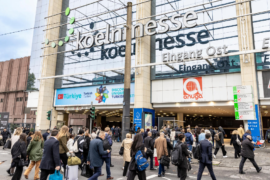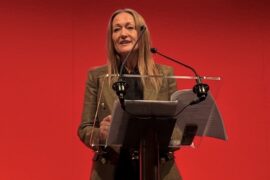The annual meeting of the Deutsches Tiefkühlinstitut (dti), recently held in Köln, celebrated the 60th Anniversary of the German frozen food trade association. More than 240 delegates attended the two-day event in the Rhineland city, where the dti was headquartered for most of its existence before moving to Berlin in 2010.
Guests hailing from throughout the German and international frozen food sector were welcomed by Gottfried Hares, the dti’s chief executive officer, and Dr. Sabine Eichner, its managing director.
 A special night featuring musical entertainment, fine food and drink to toast dti’s six decades of service to the industry was held at the Crystal Palace of Flora, on the grounds of Botanic Garden of Köln, which was inaugurated in 1864.
A special night featuring musical entertainment, fine food and drink to toast dti’s six decades of service to the industry was held at the Crystal Palace of Flora, on the grounds of Botanic Garden of Köln, which was inaugurated in 1864.
“Look into the Future – Prospects for the Frozen Food Industry” was the theme of the conference at the Hilton Hotel that followed the next day, which tackled subjects ranging from frozen food consumption and nutrition trends, evolving business models and competition, to the impact of digitalization on production, sales and communication, to political, social and economic changes, as well as ecological stability questions.
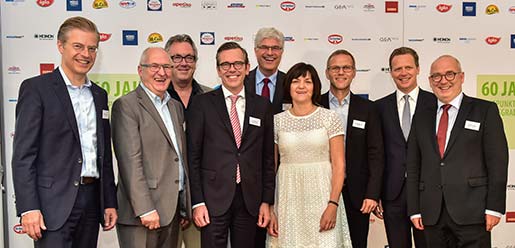 Deutsches Tiefkühlinstitut (dti) CEO Gottfried Hares (far right), Managing Director Dr. Sabine Eichner (fourth from right) and members of the board of directors are all smiles as the German frozen food industry trade association celebrated its 60th Anniversary in Köln.
Deutsches Tiefkühlinstitut (dti) CEO Gottfried Hares (far right), Managing Director Dr. Sabine Eichner (fourth from right) and members of the board of directors are all smiles as the German frozen food industry trade association celebrated its 60th Anniversary in Köln.
Speakers addressing the issues offered various perspectives from different professional backgrounds including industry, trade, research, catering, food technology and consumer protection. They offered ideas for strategy development and impetus for the frozen business of the future.
The chief executive officer of Nestlé Germany, Béatrice Guillaume-Grabisch, opened the sessions by zeroing in on the “game changer” for consumer diets and the foods of the future. In the frozen sector, she said, more opportunities than risks have been identified due to a number of factors including convenience and cost benefits. The ceo encouraged closer cooperation between manufacturers and retailers, and called for better communication with end-users.
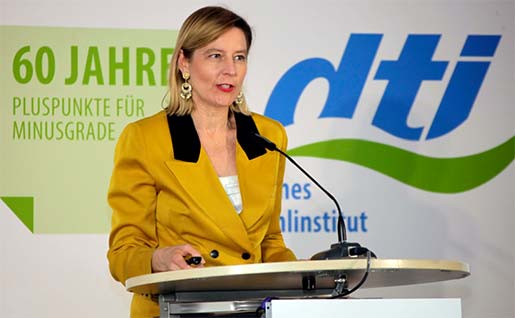 Nestlé Germany CEO Béatrice Guillaume-Grabisch kicks off the conference with a speech entitled “Diet of the Future: Trends and Drivers of the Frozen Food Market.”
Nestlé Germany CEO Béatrice Guillaume-Grabisch kicks off the conference with a speech entitled “Diet of the Future: Trends and Drivers of the Frozen Food Market.”
Prof. Dr. Werner Reinartz, director of the Institute for Trade Research Cologne and a renowned German economist, discussed the “destructive processes” that are triggered by the digitization in the business world. Against the backdrop of massive value shifts, he said that the frozen food industry must redefine itself in today’s digital environment to be more relevant to shoppers who tend often to purchase ambient food products for almost immediate consumption.
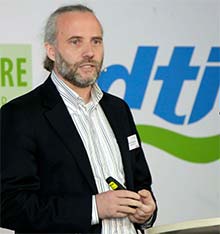 “Frozen in Gastronomy: Stopgap or Big Love” was the subject of Chef Heiko Antoniewicz’s remarks.Chef Heiko Antoniewicz talked about the importance of utilizing frozen components in the catering industry. He emphasized the quality mentality shared by Japanese consumers, which is highly appreciative of results from deep-freezing fish quickly after landing to maintain quality for sashimi and sushi dishes, while also ensuring food safety and maximizing utilization.
“Frozen in Gastronomy: Stopgap or Big Love” was the subject of Chef Heiko Antoniewicz’s remarks.Chef Heiko Antoniewicz talked about the importance of utilizing frozen components in the catering industry. He emphasized the quality mentality shared by Japanese consumers, which is highly appreciative of results from deep-freezing fish quickly after landing to maintain quality for sashimi and sushi dishes, while also ensuring food safety and maximizing utilization.
Dr. Ing. Volker Heinz, managing director of the German Institute of Food Technologies, pointed out that frozen food products are bound to play an increasingly important role in feeding consumers in Europe’s mega cities and suburban markets.
Stiftung Warentest CEO Hubertus Primus attested to the high quality of frozen foods, provided that each link of the cold chain has been properly maintained. From its first analysis of frozen products back in 1966, the independent consumer testing organization’s reviews of frozen ready meals, vegetables and other products are highly regarded by German language readers.
The final presentation was given by Prof. Dr. Klaus Töpfer, Germany’s former Environment Minister and Director of the United Nations Environment Program. Maintaining that the conversion to a “circular economy” will have to continue massively to reduce the consumption of resources, he criticized the throwaway mentality of industrialized society as well as unnecessarily high levels of agricultural post-harvest losses. On the bright side, the frozen food industry is destined to play an even more important role in conserving valuable food resources and curbing food wastage, according to Töpfer.


